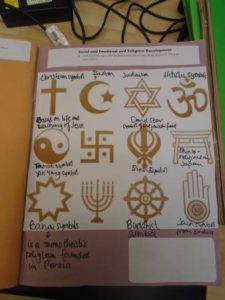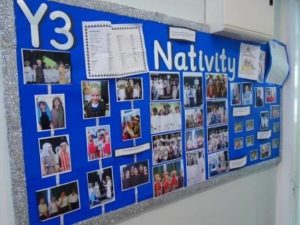 Our R.E Intent
Our R.E Intent
‘RE is like an iceberg. As you unpack ideas, you come to understand deeper meaning.’
At Holly Park Primary School, we value and celebrate the rich diversity of the community we serve. As such, through the teaching of Religious Education we seek to promote and encourage respect for all people of different religions and world views.
At Holly Park we use Discovery RE to lead us through our RE journey. Each year group will learn about Christianity and another world faith. Children will be able to gain a deep understanding of religions and world views by being encouraged to ask questions and with the help of a friendly owl. Children will also learn from religion and will have regular opportunities to discuss their thoughts on issues that will help to develop their sense of belonging and identity, for example human rights, equality, tolerance, morality, charity and kindness.
Strong links will also be made to the British Values, Children’s Rights and SMSC development. As a result, RE will help children to reflect on the kind of person they want to be as a member of Holly Park School but also as citizens of the world.
‘Differences were made not to divide but to enrich.’ J.H Oldham
Our RE Curriculum Map: Holly Park RE Curriculum Map
Our RE curriculum strategy RE Strategy
RE Golden threads document RE Golden Threads Knowledge overview: RE Golden Threads Knowledge overview
Some examples of our RE learning organisers:
- Nursery Autumn 2 HPS Christianity Christmas What is Christmas
- Reception Autumn 1 HPS Christianity What Makes people special
- Yr1 Summer 1 HPS Judaism Is Shabbat important to Jewish children
- Yr2 Spring 1 HPS Islam Does praying at regular intervals help a muslim in their everyday life
- Yr3 Autumn 1 HPS Hinduism Does celebrating Diwali bring a sense of belonging
- Yr4 Spring 1 HPS Buddhism Could the Buddhas teachings make the world a better place
- Yr5 Summer 1 HPS Sikhhism What is the best way for a Sikh to show commitment to God
- Yr6 Spring 1 HPS Christianity Is anything ever eternal
Children will have the opportunity to reflect on what it means to have a faith. We have a strong understanding of how RE can play a leading role in pupils’ spiritual, moral, social and cultural development. At Holly Park we know how relationships with members of local communities and local faith communities can enrich pupils’ experiences in RE and we strive to cultivate and maintain these relationships. We welcome members of local faith groups and communities to come into our school to support our learning and bring RE to life for our pupils.
Discover RE works alongside the syllabus agreed by the Borough of Barnet. Here it is: Barnet Agreed Syllabus.
 The aim of Religious Education in the Agreed Syllabus is to enable students to explore the nature of religion and fundamental questions of human experience.
The aim of Religious Education in the Agreed Syllabus is to enable students to explore the nature of religion and fundamental questions of human experience.
Religious Education should therefore help pupils to:
- develop an understanding of the influence of beliefs, values and traditions on individuals, communities and societies
- enhance and reflect on their own spiritual, moral, social and cultural development
- grow in confidence in their own faith and respect those with a faith different from their own
- develop a positive attitude to living in a religiously diverse society
- develop the ability to make reasoned and informed judgements about religious and moral issue.

We believe in teaching a broad and balanced curriculum. We think carefully about the needs of our community and plan in a flexible and creative way. Children uphold the school values and respect the religious beliefs of both their local community and the wider society; encouraging empathy, generosity and compassion.
At Holly Park our children will learn about the following world religions and visit the following places of worship:
Early Years: Christianity, Judaism, Hinduism, Islam, Sikhi
Year 1 –Christianity and Judaism and will visit a Church
Year 2 –Christianity, Judaism and Islam and will visit a synagogue
Year 3 – Christianity and Hinduism and visit a Hindu Temple
Year 4 – Christianity and Buddhism and visit a Church
Year 5 – Christianity and Sikhi and visit a Gurdwara
Year 6 – Christianity and Islam and visit a Mosque
*At Holly Park, RE is inclusive for all pupils. Every pupil has a legal entitlement to RE. It is a necessary part of a broad and balanced curriculum. RE is locally determined by a Locally Agreed Syllabus. LA Maintained schools follow this agreed syllabus. The law requires all schools to teach Christianity and other world faiths. One of the key roles of RE in schools is to encourage community cohesion and the development of SMSC and Fundamental British Values. In the UK, parents have the right to withdraw their child from RE on the grounds that they wish to make their own provision. The alternative will be the parents’ responsibility. Parents wishing to withdraw a child should make a request in writing and in discussion with the Headteacher. This will be reviewed annually.

















